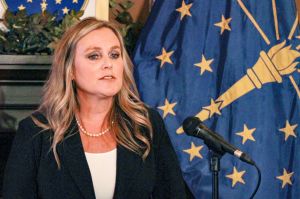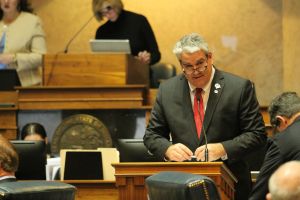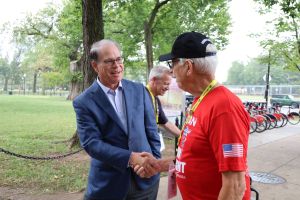
Kellie Streeter, candidate for House District 45. This is Streeter's first time running for a state office. (Clayton Baumgarth - WFIU/WTIU)
As part of WTIU/WFIU News’ 2024 election coverage, reporter Clayton Baumgarth invited the three candidates running for Indiana’s 45th House District to discuss their policy positions.
The three candidates are Republicans Bruce Borders, the incumbent, Jeff Ellington, who is running for the office a second time, and Kellie Streeter, a newcomer from northern Knox county.
Indiana’s 45th District consists of Greene and Sullivan counties, and portions of Daviess, Knox and Vigo counties in southwest Indiana.
The conversation with Bruce Borders can be found here.
The conversation with Jeff Ellington can be found here.
This conversation has been edited for clarity and conciseness.
Clayton Baumgarth: You’ve touched on this a little bit already (off camera), but how did you first get into politics?
Kellie Streeter: Well, as an emergency manager, EMA in Indiana, every county has one, you get used to working with local government officials, business, education, health care, just to make sure they're all prepared for any emergency that might happen. You do training and exercise with public safety. And that really prepares me for an all-hazards, all-discipline approach to making sure people have someone to work with. Well when my Commissioner passed away, I recognized my skill set was much like a commissioner, really working with so many other people in the community for a whole facet of reasons. So I went to caucus against three others in 2016. I won on the first vote, and then county residents reelected me again and ‘18 and ‘22.
CB: Why are you running for House District 45?
KS: Well, that's an excellent question. As the president of Indiana County Commissioners, I've spent the last three years at our capitol building lobbying on behalf of our county’s needs, from solar and wind legislation to public health legislation, to contracting authority, all the way to our community mental health centers, which is a very important topic still yet to come. Transportation also a big issue that I have worked with both sides in the General Assembly on. I've testified over and over and over again, and really worked with AIC and many other groups to make sure counties have a voice, and counties have a seat at the table to where our rights aren't over spoken by state government. So because of all of that, and that's a lot, I’ve witnessed how my representatives have handled their own votes and have handled their own committees. I've attended many of the committees they are in and I realized that we really need someone that's closer to the people. We really need someone that has a better understanding of how that vote impacts locals, especially in a very rural district. So I felt that he really was at a touch. And that's where I decided with my family and my friends, that, you know what, I'm a solutions-type of lady and I'm going to file. I'm ready, and here we are.
CB: What makes you the right candidate for House District 45?
KS: Well, like I mentioned, our district is very rural. Our greatest grossing wage job is coal. I live in the middle of the coal mine and I have worked with the coal companies hand in hand almost every week for years. I understand the impact on our economy, and I also understand the impact of how the state and the federal government are always trying to look at changing the way our renewables are impacting our economy as well as reliable energy. So I want to be at that table to discuss that. Also in rural Indiana, it always seems to, and it sounds cliche, but the people in the urban areas in the cities do have more resources and do have a greater voice. And seeing over and over again how statewide standards are set in our legislature that affect our land use. Property that we must protect in our district includes our farm ground, our water resources, and several other land use property rights including karst, including coal, because we have decades of mineral under our ground and carbon sequestration is starting to become a topic. And again, I’m someone that lives and works with the farmers, I am endorsed by Indiana Farm Bureau. I live in the middle of 1000s of watermelon fields. I work with the farmers every day. So having someone relevant and current to have that discussion at the statehouse, to me is incredibly important.
CB: You've touched on this a little bit in that last question, but what do you think are the largest issues impacting constituents in the district?
KS: Well, there's the ones that they absolutely 100% know about, and that's taxes. That's a huge concept, but the state of Indiana through legislation have put together several committees and task forces to review state and local taxes. That's being heard right now, including gas tax. So those topics will be at the forefront of discussion in this next budget session. And again, counties operate solely their general fund on property taxes, our roads and bridges are solely, almost solely and 90% in most counties, funded by fuel tax. So once the state starts moving around these formulas, counties are affected, immediate. So again, someone that understands how our budgets operate, needs to be at the table to discuss. We can talk about it, but counties and rural areas need to be at the discussion.
Secondly, I believe that, I don't know if you've seen the news, but FSSA has seen an impending shortfall of a billion dollars for the Medicaid program. Well, in my community, in my district, we are again very rural and more low-to-moderate income. And we have county hospitals, and the reimbursement rates that we're seeing to fund our operations are starting to see the pinch. 60% to 70% of the people that walk into our hospital doors, our neighbors and residents, are on Medicaid and or Medicare. So once we start looking at removing services, removing programs, changing the formulas of Medicaid, that affects our county hospitals, and it also affects the people. So I believe that's going to be a very large topic. I'm on the Board of Governors at a county hospital, Good Samaritan, so I'm intimately familiar with how that impacts the patient, how that impacts the hospital. And I also think I will be great at the table to talk about that.
The third thing that is undoubtedly going to be discussed. Well, let me rephrase that, we're going to have a new governor. And there is also going to be a vast amount of people that are new in the legislature. So. again, I think someone with local experience looking at how these changes are going to roll out quickly. I'm prepared to take it as it comes, so to say.
CB: How willing are you to work with those across the aisle on the issues faced by your constituents?
KS: There's a lot of, must-have, firm stances to be Republican in Indiana. So I am pro-life. I am pro-Second Amendment. I am very much a Christian conservative. It's how I've been raised and how I raise my children. But locally, when you are a county official, the borders of cities and counties, they should never be separate. And we have worked closely together, the mayors of both cities or Democrats, we have worked on several very, very beneficial programs for economic development, a co-working center, transportation, we formed an EMS together. So we don't agree on social issues, but we do agree on what's best for our community and the people that live there. I am a natural mediator. I'm a natural relationship builder. So I foresee in the legislature I will be the same. We're going to disagree, but we're going to figure out a solution no matter what.
CB: If you're elected, what single issue or topic do you think is going to be top of mind when you take office?
KS: Well, transportation is definitely going to be top of mind. The road funding formula hasn't been reviewed in many years, we do have anticipated electric vehicles coming onto the system that aren't within that gas tax realm. There's going to be much discussion around how are we going to fund roads and bridges and drainage and other safety issues on our systems in Indiana. And I intend to make sure that counties, if bills must be crafted to make sure we have that fair share, because we have more roads, more bridges in worse shape in the state of Indiana as a whole. Also health care reform. And having access to mental health, behavioral health, and even OB services in rural Indiana. We're seeing more and more retiring, we're seeing less and less coming out of schools just like this and going into rural health care because of larger corporate systems having the greater ability to hire. We've done great in the trades and supporting trades in Indiana, but now we need to look back at some of those skilled workers, like teachers, and like nurses and like physicians and I would like to look at programs to assist with putting more in that pipeline.
CB: You are running against Representative Borders and Jeff Ellington, what would you say sets you apart from those two candidates?
KS: Well, Mr. Borders and Mr. Ellington have been in office, ran for this office, have had much opportunity over the years to advance great benefit programs and bills for our district. Mr. Borders hasn’t introduced and successfully passed any. He's been there over 20 years, or running for over 20 years, and just really doesn't have the knowledge and the readiness as I do. I think sometimes when you've been there too long, it's very clear to the people, and I think that's where I'm seeing successes in my campaign. Mr. Ellington, I believe, has done some good things in the legislature. However still, I don't believe he has focus on local home rule. He's very much been a part of the Bloomington system of as a legislature. But when you get into the more rural parts of my community, I don't feel he has as much knowledge as I have. So I think it's time for someone new. I think it's time for someone with relationships that are built in local government in the legislature. And I think I have a stronger voice that's more respected and ready to be listened to than the other two as well.
CB: How do you feel your time as Knox County Commissioner has helped prepare you for this role in particular?
KS: Running a county government isn't near the size of running state legislative office, it's much bigger, I know that sounds silly. But every day I hear from someone in my county about their road, a stop sign, someone incarcerated in my jail, someone going through the child support system. I help run a county hospital, I hear about how it took 30 days to get into their primary care physician. I hear from people that have animal control issues. I have 292 employees that I have to worry about their benefits and how they need FMLA. I have to worry about someone that falls on the courthouse stairs and making sure that people are protected when they visit our county property. It's something every day. And I have learned so much about what it takes to run government and run an efficient government and make sure that government doesn't get too big so that the people aren't exponentially taxed, so we can keep taxes low. So if you take all of that and put it on the scale to capital, I feel that I'm the perfect fit.
CB: Next year is a budget year, with the new governor on that budget. What do you think are the top priority items to consider?
KS: Behavioral health and mental health. Senate enrolled act one, just last budget session, put together a robust plan of how to roll out the first phase of how do we help the people who need the most help and those are people suffering from anxiety, depression, looking at suicide rates, how do we help the intellectually disabled? How do we help the elderly, because they're often forgotten. That will be a next very high topic. And I'm sure under the next governor as well because it impacts our economy, our workforce across the board, so I can't wait to work on with our next governor and our next legislature. Also, there's going to be without a doubt, education. There's always bills introduced, our governor always introduces how we benefit our schools and our children. As a mother of two in school currently, I have one graduated, I have a fourth grader and a seventh grader, I understand the role of parents, educators, and our corporation leadership. So that's going to be a very hot topic in Indiana. It always is, but I think we're going to see more discussion around teachers, and I can't wait to also be a part of that.
CB: I’m actually really glad you brought that up, because my next question was going to be about how education is a huge part of that budget. How do you feel about all the consolidations and referendums going on throughout the state?
KS: We don't see that much in our district, with consolidation and referendums. Much of our consolidation was done many years ago. I understand statewide, a lot of that is done to save money, to consolidate schools to save budgets, bottom lines, where there's a shortage of teachers. Referendums, I think that people should have the opportunity to vote. If you look at the tax dollar, half of it goes to our schools. As it should. We need to provide a solid foundation for our children for the future. There's nothing more that affects our children than parents and schools. So I really support our local schools, I really support having strong relationships with them. But at the same time, we as government leaders also need to be engaged on how they're funded and the information our children are learning. So it's definitely going to be an engaging topic, and I hope to be at that table.
CB: Are there any social justice issues that you plan to tackle if you were to take this office?
KS: There are not. I think Indiana has done, our General Assembly has done, a very good job on passing the social justice laws that I believe in. I will still make sure we look at gun control for those with mental health issues. That is a serious issue. I think guns are a people problem. So if there would be any it would be wrapped around that. But ultimately, no Indiana stands strong.
CB: Last session, there were a lot of bills passed regarding higher education. What are your thoughts on the state of higher education in Indiana?
KS: I think first of all, teacher shortage is a problem. In my school corporations in my district, it is very concerning that there are many instructing our children, as well as counseling our children that have not received a license to do so. This is an impending problem, in my mind. I'm not saying people aren't smart enough to have some aid training and some other lower level training, but we really need to make sure that we have the highest quality teachers possible to teach our children. So looking at programs and or incentives to create a stronger pipeline, I think would be one of my highest priorities.
CB: Then finally, why should district voters choose you?
KS: I am ready to serve each and every one of the people in my community. I have and do every day of my life as a commissioner and an administrator of a health department. I work very hard, almost to my detriment. And I'm almost probably the most successful county official around. I am dedicated to making sure that the people have good government that works in a positive way. And I also believe in keeping the public safe. So I think that's at the core of me, that we should always support our local fire, law enforcement, EMS, 911, our veterans. And I am, I don't know how to say it any better, I am absolutely ready to stand up and speak on our behalf.











